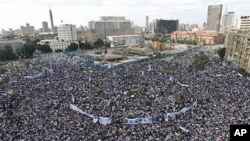A study by Global Integrity, an international nonprofit organization, says corruption risks increased in Egypt, some Middle Eastern, North African and Eastern European nations before this year's popular uprisings that swept the region.
Global Integrity Managing Director Nathaniel Heller likened corruption to a black hole when he spoke to reporters at the release of a new report he said seeks to measure transparency and good governance measures that can counter corruption.
Heller said anti-corruption data collected in 2010 for Yemen, Morocco, and the West Bank show they face challenges similar to those experienced in Egypt before that country's popular uprising in January.
"Looking back across several years of assessments from countries like Egypt, Yemen, Morocco, the West Bank, we have seen a steady decline almost universally in the region and for almost all countries dating back to at least 2006," he said. "In Egypt in particular, we saw this steady march downward from a situation that was already very challenging when it came to anti-corruption and transparency to one that was becoming an incredibly poor situation."
The new study finds that Egypt, Yemen, Morocco and the West Bank did not fare well on measures to promote anti-corruption safeguards, such as an independent media, transparency of senior government officials' assets and effective auditing of government programs to ensure funds were not being diverted.
Global Integrity has generated 207 national assessments since 2006. In that time, Israel and the United Arab Emirates were the only two countries studied in the Middle East and North Africa that avoided the label of "very weak" on anti-corruption safeguards.
"In some ways, it is not surprising what is going on," said Heller. "I think we are starting to see the real evidence of a breaking point when it comes to citizens just being unable to deal with a scenario in which there is virtually zero government accountability, zero means of seeking redress for abuse of power."
It is not just the Middle East and North Africa that concern the Washington-based nonprofit.
Global Integrity says there was improvement in Eastern European nations, such as Bulgaria, Romania and Poland as they strove to meet requirements to join the European Union and NATO. But, Heller said, since these nations joined these international blocs, they have felt less pressure to maintain anti-corruption and transparency gains.
"And, three or four years ago, we predicted that we would see these data decline over time as that carrot and that incentive disappeared. When we looked at the data for this year from the 2010 results for Romania, Bulgaria and Poland in particular, unfortunately, we saw that prediction borne out precisely," said Heller.
In South Asia, Global Integrity found anti-corruption safeguards weakened significantly in Pakistan last year for the first time, after the country struggled for years as a "middle performer." Heller said he suspects that corruption probably played a role in terrorist Osama bin Laden's ability to elude capture until he was killed by U.S. commandos.
"And given what we now know, just from media reporting about the bin-Laden raid and where he was living for the past several years, I think it does raise some really interesting questions in terms of how someone like that could live in a giant villa, close to a military base, close to the national capital, and simply not raise eyebrows for several years," he said.
Global Integrity says Argentina, Peru and Ethiopia all demonstrated a noticeable improvement in anti-corruption performance in 2010. The report said, in Ethiopia, there have been gains in the areas of public access to information, civil service professionalism, conflict of interest safeguards across all three branches of government, as well as political financing transparency safeguards.
Global Integrity says it bases its report on the findings of local researchers, journalists and academics.













